Assignment 1: Company Law - Director's Duties and Responsibilities
VerifiedAdded on 2020/05/03
|8
|1724
|86
Report
AI Summary
This report analyzes the director's duties and fiduciary responsibilities within the framework of company law, focusing on the case of Vegas Ltd. and its directors, Mr. Bond, Dr. No, Mr. Big, and Mr. White. The report employs the IRAC method to address two key questions: whether Mr. Bond breached his director's duties and whether Dr. No, Mr. Big, and Mr. White breached their duties. It examines the relevant sections of the Corporations Act 2001, including duties of care, diligence, good faith, and the prohibition of improper use of position and information. The analysis draws on case law such as the Centro case, James Hardie case, and ASIC v. Adler, highlighting the responsibilities of both executive and non-executive directors. The report concludes that Mr. Bond breached his fiduciary duty and that Dr. No, Mr. Big, and Mr. White also breached their duties of care and diligence by failing to adequately review financial reports. The bibliography includes relevant books, cases, and legislation.
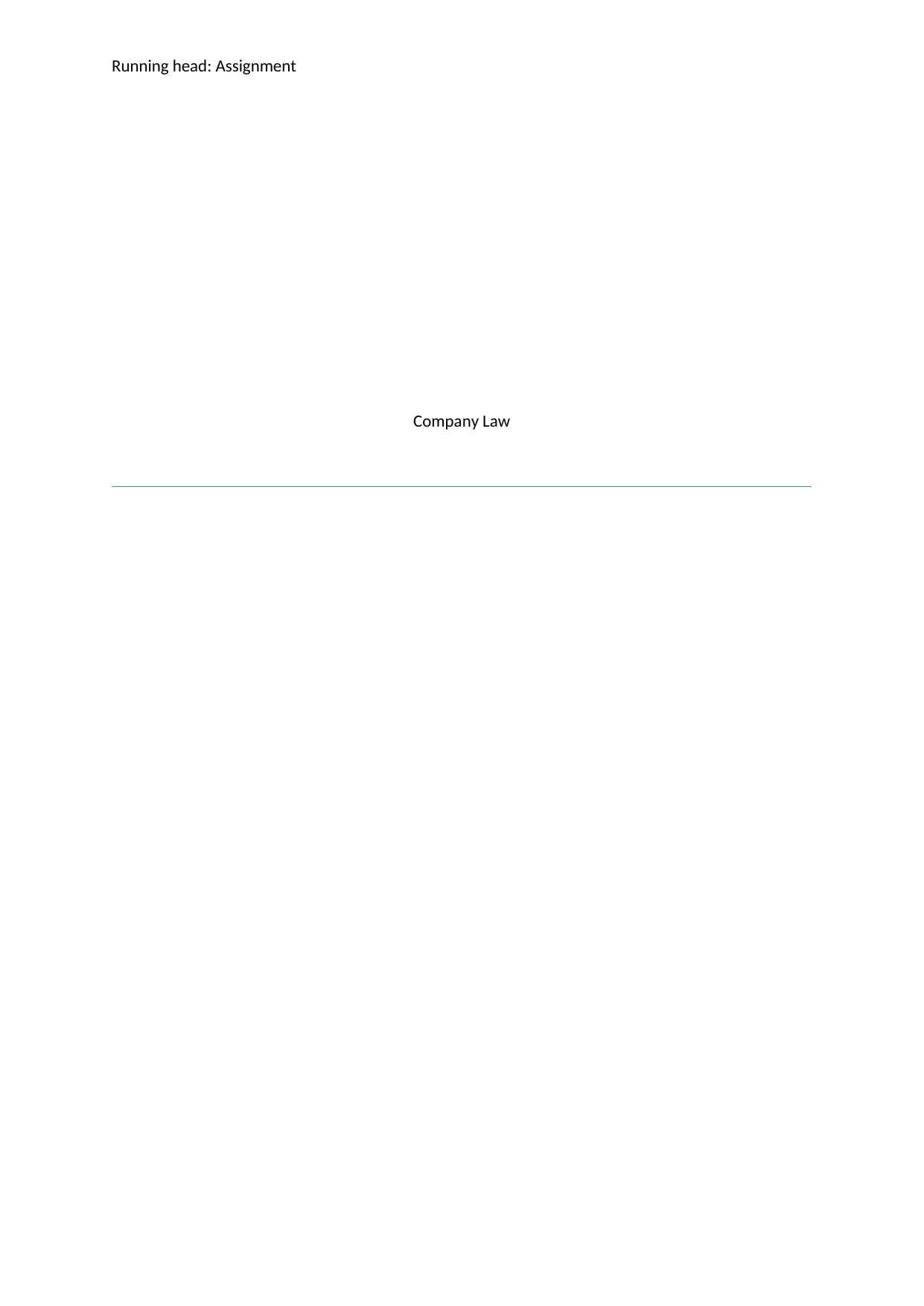
Running head: Assignment
Company Law
Company Law
Paraphrase This Document
Need a fresh take? Get an instant paraphrase of this document with our AI Paraphraser
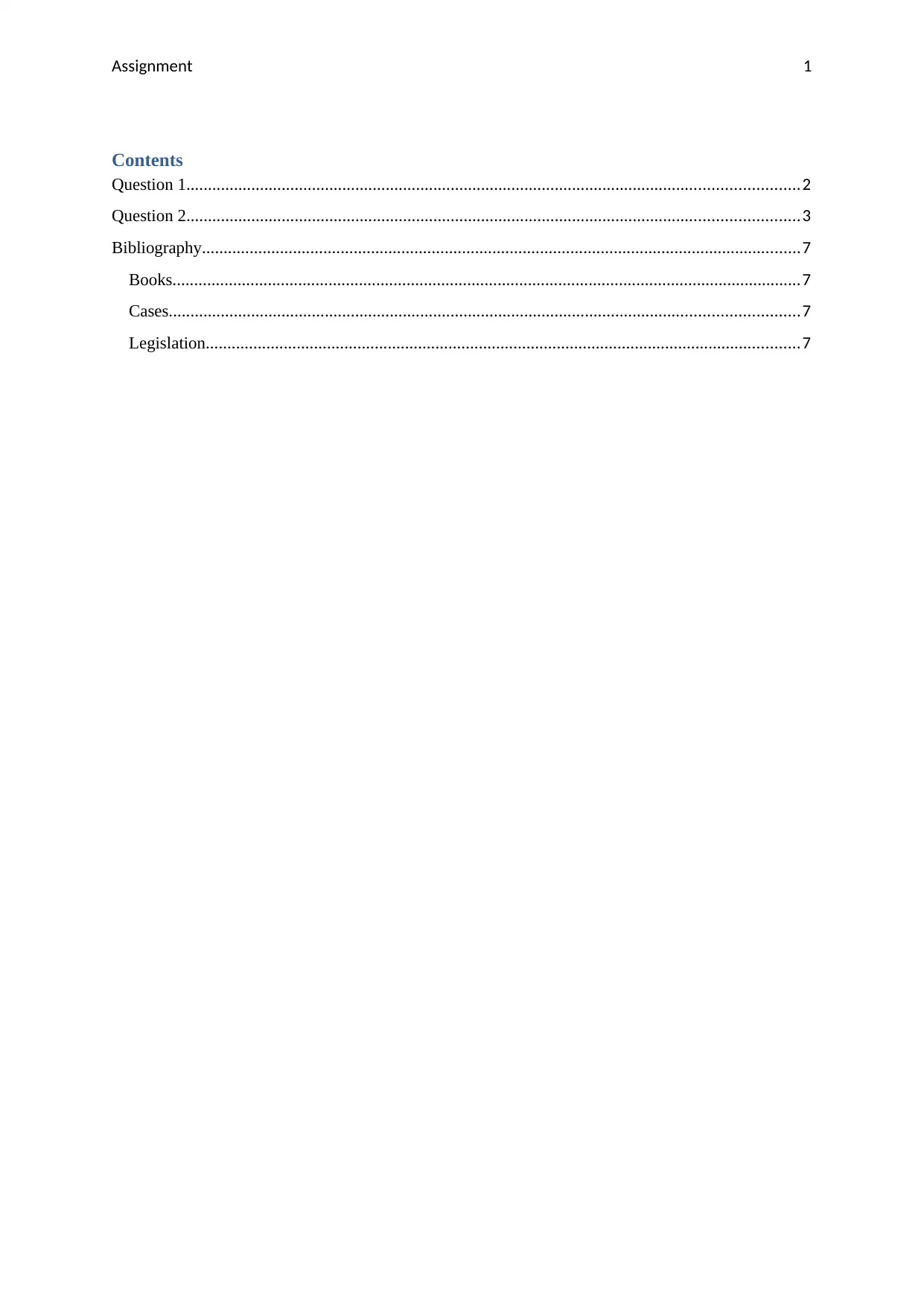
Assignment 1
Contents
Question 1.............................................................................................................................................2
Question 2.............................................................................................................................................3
Bibliography..........................................................................................................................................7
Books.................................................................................................................................................7
Cases.................................................................................................................................................7
Legislation.........................................................................................................................................7
Contents
Question 1.............................................................................................................................................2
Question 2.............................................................................................................................................3
Bibliography..........................................................................................................................................7
Books.................................................................................................................................................7
Cases.................................................................................................................................................7
Legislation.........................................................................................................................................7
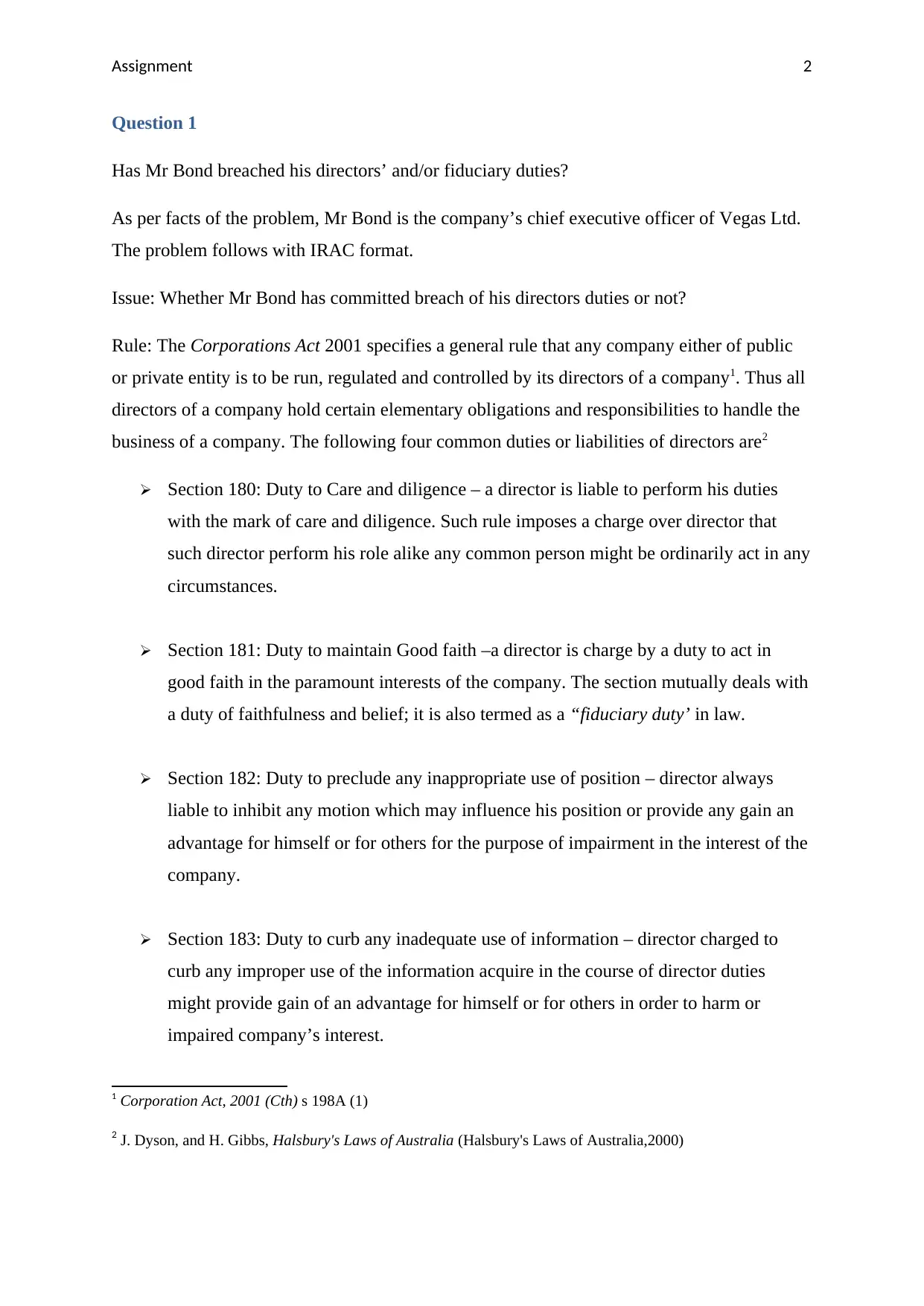
Assignment 2
Question 1
Has Mr Bond breached his directors’ and/or fiduciary duties?
As per facts of the problem, Mr Bond is the company’s chief executive officer of Vegas Ltd.
The problem follows with IRAC format.
Issue: Whether Mr Bond has committed breach of his directors duties or not?
Rule: The Corporations Act 2001 specifies a general rule that any company either of public
or private entity is to be run, regulated and controlled by its directors of a company1. Thus all
directors of a company hold certain elementary obligations and responsibilities to handle the
business of a company. The following four common duties or liabilities of directors are2
Section 180: Duty to Care and diligence – a director is liable to perform his duties
with the mark of care and diligence. Such rule imposes a charge over director that
such director perform his role alike any common person might be ordinarily act in any
circumstances.
Section 181: Duty to maintain Good faith –a director is charge by a duty to act in
good faith in the paramount interests of the company. The section mutually deals with
a duty of faithfulness and belief; it is also termed as a “fiduciary duty’ in law.
Section 182: Duty to preclude any inappropriate use of position – director always
liable to inhibit any motion which may influence his position or provide any gain an
advantage for himself or for others for the purpose of impairment in the interest of the
company.
Section 183: Duty to curb any inadequate use of information – director charged to
curb any improper use of the information acquire in the course of director duties
might provide gain of an advantage for himself or for others in order to harm or
impaired company’s interest.
1 Corporation Act, 2001 (Cth) s 198A (1)
2 J. Dyson, and H. Gibbs, Halsbury's Laws of Australia (Halsbury's Laws of Australia,2000)
Question 1
Has Mr Bond breached his directors’ and/or fiduciary duties?
As per facts of the problem, Mr Bond is the company’s chief executive officer of Vegas Ltd.
The problem follows with IRAC format.
Issue: Whether Mr Bond has committed breach of his directors duties or not?
Rule: The Corporations Act 2001 specifies a general rule that any company either of public
or private entity is to be run, regulated and controlled by its directors of a company1. Thus all
directors of a company hold certain elementary obligations and responsibilities to handle the
business of a company. The following four common duties or liabilities of directors are2
Section 180: Duty to Care and diligence – a director is liable to perform his duties
with the mark of care and diligence. Such rule imposes a charge over director that
such director perform his role alike any common person might be ordinarily act in any
circumstances.
Section 181: Duty to maintain Good faith –a director is charge by a duty to act in
good faith in the paramount interests of the company. The section mutually deals with
a duty of faithfulness and belief; it is also termed as a “fiduciary duty’ in law.
Section 182: Duty to preclude any inappropriate use of position – director always
liable to inhibit any motion which may influence his position or provide any gain an
advantage for himself or for others for the purpose of impairment in the interest of the
company.
Section 183: Duty to curb any inadequate use of information – director charged to
curb any improper use of the information acquire in the course of director duties
might provide gain of an advantage for himself or for others in order to harm or
impaired company’s interest.
1 Corporation Act, 2001 (Cth) s 198A (1)
2 J. Dyson, and H. Gibbs, Halsbury's Laws of Australia (Halsbury's Laws of Australia,2000)
⊘ This is a preview!⊘
Do you want full access?
Subscribe today to unlock all pages.

Trusted by 1+ million students worldwide
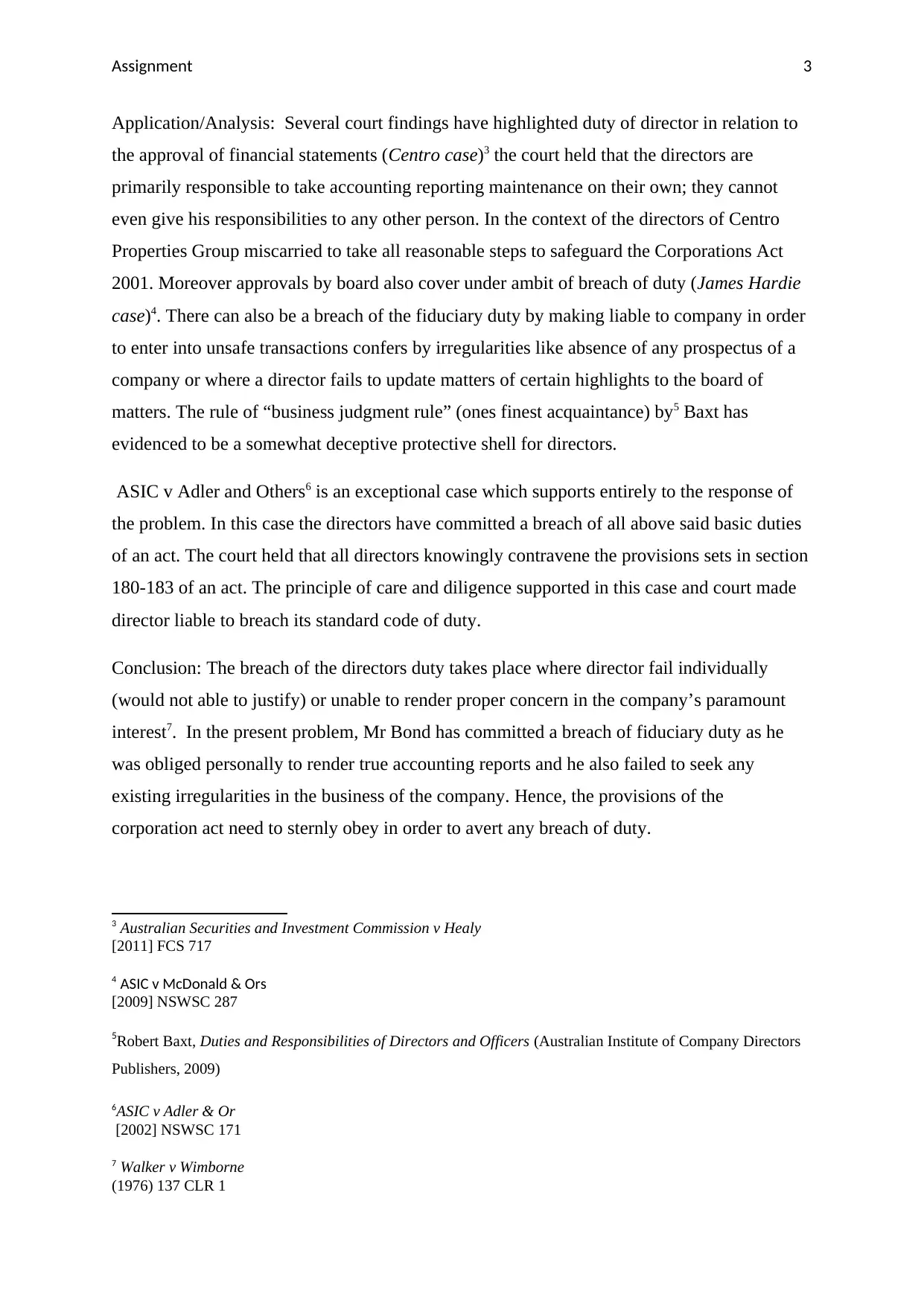
Assignment 3
Application/Analysis: Several court findings have highlighted duty of director in relation to
the approval of financial statements (Centro case)3 the court held that the directors are
primarily responsible to take accounting reporting maintenance on their own; they cannot
even give his responsibilities to any other person. In the context of the directors of Centro
Properties Group miscarried to take all reasonable steps to safeguard the Corporations Act
2001. Moreover approvals by board also cover under ambit of breach of duty (James Hardie
case)4. There can also be a breach of the fiduciary duty by making liable to company in order
to enter into unsafe transactions confers by irregularities like absence of any prospectus of a
company or where a director fails to update matters of certain highlights to the board of
matters. The rule of “business judgment rule” (ones finest acquaintance) by5 Baxt has
evidenced to be a somewhat deceptive protective shell for directors.
ASIC v Adler and Others6 is an exceptional case which supports entirely to the response of
the problem. In this case the directors have committed a breach of all above said basic duties
of an act. The court held that all directors knowingly contravene the provisions sets in section
180-183 of an act. The principle of care and diligence supported in this case and court made
director liable to breach its standard code of duty.
Conclusion: The breach of the directors duty takes place where director fail individually
(would not able to justify) or unable to render proper concern in the company’s paramount
interest7. In the present problem, Mr Bond has committed a breach of fiduciary duty as he
was obliged personally to render true accounting reports and he also failed to seek any
existing irregularities in the business of the company. Hence, the provisions of the
corporation act need to sternly obey in order to avert any breach of duty.
3 Australian Securities and Investment Commission v Healy
[2011] FCS 717
4 ASIC v McDonald & Ors
[2009] NSWSC 287
5Robert Baxt, Duties and Responsibilities of Directors and Officers (Australian Institute of Company Directors
Publishers, 2009)
6ASIC v Adler & Or
[2002] NSWSC 171
7 Walker v Wimborne
(1976) 137 CLR 1
Application/Analysis: Several court findings have highlighted duty of director in relation to
the approval of financial statements (Centro case)3 the court held that the directors are
primarily responsible to take accounting reporting maintenance on their own; they cannot
even give his responsibilities to any other person. In the context of the directors of Centro
Properties Group miscarried to take all reasonable steps to safeguard the Corporations Act
2001. Moreover approvals by board also cover under ambit of breach of duty (James Hardie
case)4. There can also be a breach of the fiduciary duty by making liable to company in order
to enter into unsafe transactions confers by irregularities like absence of any prospectus of a
company or where a director fails to update matters of certain highlights to the board of
matters. The rule of “business judgment rule” (ones finest acquaintance) by5 Baxt has
evidenced to be a somewhat deceptive protective shell for directors.
ASIC v Adler and Others6 is an exceptional case which supports entirely to the response of
the problem. In this case the directors have committed a breach of all above said basic duties
of an act. The court held that all directors knowingly contravene the provisions sets in section
180-183 of an act. The principle of care and diligence supported in this case and court made
director liable to breach its standard code of duty.
Conclusion: The breach of the directors duty takes place where director fail individually
(would not able to justify) or unable to render proper concern in the company’s paramount
interest7. In the present problem, Mr Bond has committed a breach of fiduciary duty as he
was obliged personally to render true accounting reports and he also failed to seek any
existing irregularities in the business of the company. Hence, the provisions of the
corporation act need to sternly obey in order to avert any breach of duty.
3 Australian Securities and Investment Commission v Healy
[2011] FCS 717
4 ASIC v McDonald & Ors
[2009] NSWSC 287
5Robert Baxt, Duties and Responsibilities of Directors and Officers (Australian Institute of Company Directors
Publishers, 2009)
6ASIC v Adler & Or
[2002] NSWSC 171
7 Walker v Wimborne
(1976) 137 CLR 1
Paraphrase This Document
Need a fresh take? Get an instant paraphrase of this document with our AI Paraphraser
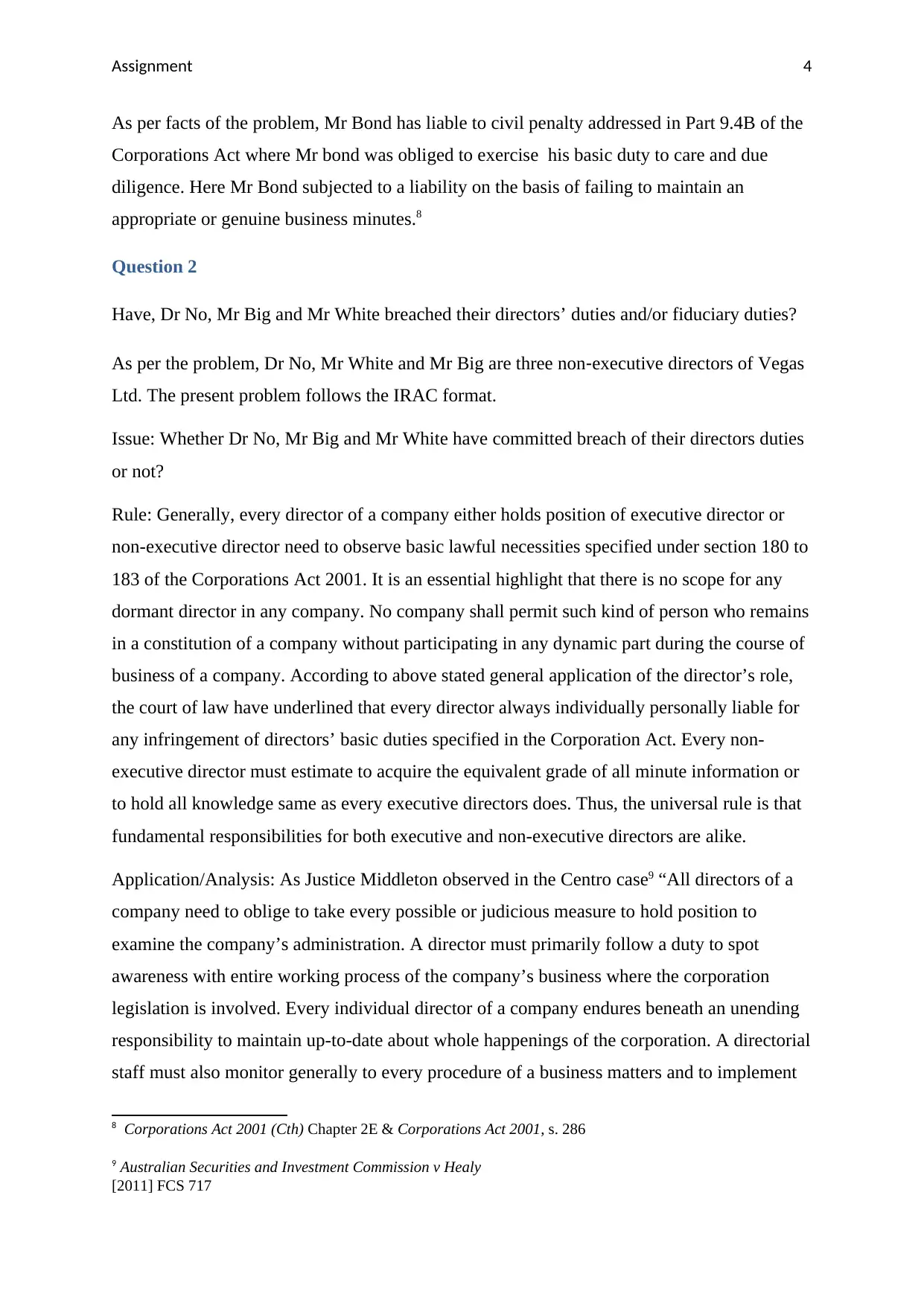
Assignment 4
As per facts of the problem, Mr Bond has liable to civil penalty addressed in Part 9.4B of the
Corporations Act where Mr bond was obliged to exercise his basic duty to care and due
diligence. Here Mr Bond subjected to a liability on the basis of failing to maintain an
appropriate or genuine business minutes.8
Question 2
Have, Dr No, Mr Big and Mr White breached their directors’ duties and/or fiduciary duties?
As per the problem, Dr No, Mr White and Mr Big are three non‐executive directors of Vegas
Ltd. The present problem follows the IRAC format.
Issue: Whether Dr No, Mr Big and Mr White have committed breach of their directors duties
or not?
Rule: Generally, every director of a company either holds position of executive director or
non-executive director need to observe basic lawful necessities specified under section 180 to
183 of the Corporations Act 2001. It is an essential highlight that there is no scope for any
dormant director in any company. No company shall permit such kind of person who remains
in a constitution of a company without participating in any dynamic part during the course of
business of a company. According to above stated general application of the director’s role,
the court of law have underlined that every director always individually personally liable for
any infringement of directors’ basic duties specified in the Corporation Act. Every non-
executive director must estimate to acquire the equivalent grade of all minute information or
to hold all knowledge same as every executive directors does. Thus, the universal rule is that
fundamental responsibilities for both executive and non-executive directors are alike.
Application/Analysis: As Justice Middleton observed in the Centro case9 “All directors of a
company need to oblige to take every possible or judicious measure to hold position to
examine the company’s administration. A director must primarily follow a duty to spot
awareness with entire working process of the company’s business where the corporation
legislation is involved. Every individual director of a company endures beneath an unending
responsibility to maintain up-to-date about whole happenings of the corporation. A directorial
staff must also monitor generally to every procedure of a business matters and to implement
8 Corporations Act 2001 (Cth) Chapter 2E & Corporations Act 2001, s. 286
9 Australian Securities and Investment Commission v Healy
[2011] FCS 717
As per facts of the problem, Mr Bond has liable to civil penalty addressed in Part 9.4B of the
Corporations Act where Mr bond was obliged to exercise his basic duty to care and due
diligence. Here Mr Bond subjected to a liability on the basis of failing to maintain an
appropriate or genuine business minutes.8
Question 2
Have, Dr No, Mr Big and Mr White breached their directors’ duties and/or fiduciary duties?
As per the problem, Dr No, Mr White and Mr Big are three non‐executive directors of Vegas
Ltd. The present problem follows the IRAC format.
Issue: Whether Dr No, Mr Big and Mr White have committed breach of their directors duties
or not?
Rule: Generally, every director of a company either holds position of executive director or
non-executive director need to observe basic lawful necessities specified under section 180 to
183 of the Corporations Act 2001. It is an essential highlight that there is no scope for any
dormant director in any company. No company shall permit such kind of person who remains
in a constitution of a company without participating in any dynamic part during the course of
business of a company. According to above stated general application of the director’s role,
the court of law have underlined that every director always individually personally liable for
any infringement of directors’ basic duties specified in the Corporation Act. Every non-
executive director must estimate to acquire the equivalent grade of all minute information or
to hold all knowledge same as every executive directors does. Thus, the universal rule is that
fundamental responsibilities for both executive and non-executive directors are alike.
Application/Analysis: As Justice Middleton observed in the Centro case9 “All directors of a
company need to oblige to take every possible or judicious measure to hold position to
examine the company’s administration. A director must primarily follow a duty to spot
awareness with entire working process of the company’s business where the corporation
legislation is involved. Every individual director of a company endures beneath an unending
responsibility to maintain up-to-date about whole happenings of the corporation. A directorial
staff must also monitor generally to every procedure of a business matters and to implement
8 Corporations Act 2001 (Cth) Chapter 2E & Corporations Act 2001, s. 286
9 Australian Securities and Investment Commission v Healy
[2011] FCS 717
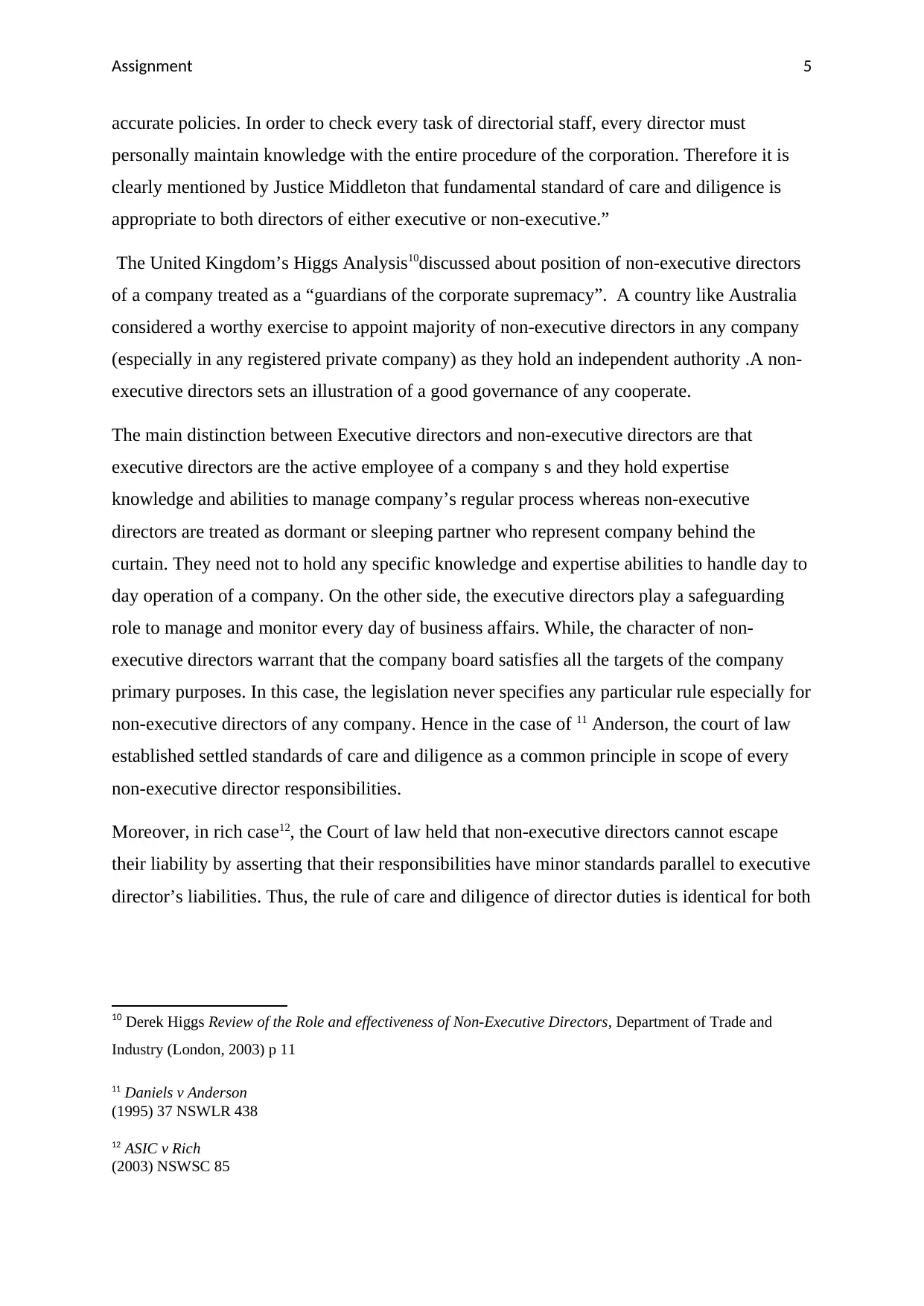
Assignment 5
accurate policies. In order to check every task of directorial staff, every director must
personally maintain knowledge with the entire procedure of the corporation. Therefore it is
clearly mentioned by Justice Middleton that fundamental standard of care and diligence is
appropriate to both directors of either executive or non-executive.”
The United Kingdom’s Higgs Analysis10discussed about position of non-executive directors
of a company treated as a “guardians of the corporate supremacy”. A country like Australia
considered a worthy exercise to appoint majority of non-executive directors in any company
(especially in any registered private company) as they hold an independent authority .A non-
executive directors sets an illustration of a good governance of any cooperate.
The main distinction between Executive directors and non-executive directors are that
executive directors are the active employee of a company s and they hold expertise
knowledge and abilities to manage company’s regular process whereas non-executive
directors are treated as dormant or sleeping partner who represent company behind the
curtain. They need not to hold any specific knowledge and expertise abilities to handle day to
day operation of a company. On the other side, the executive directors play a safeguarding
role to manage and monitor every day of business affairs. While, the character of non-
executive directors warrant that the company board satisfies all the targets of the company
primary purposes. In this case, the legislation never specifies any particular rule especially for
non-executive directors of any company. Hence in the case of 11 Anderson, the court of law
established settled standards of care and diligence as a common principle in scope of every
non-executive director responsibilities.
Moreover, in rich case12, the Court of law held that non-executive directors cannot escape
their liability by asserting that their responsibilities have minor standards parallel to executive
director’s liabilities. Thus, the rule of care and diligence of director duties is identical for both
10 Derek Higgs Review of the Role and effectiveness of Non-Executive Directors, Department of Trade and
Industry (London, 2003) p 11
11 Daniels v Anderson
(1995) 37 NSWLR 438
12 ASIC v Rich
(2003) NSWSC 85
accurate policies. In order to check every task of directorial staff, every director must
personally maintain knowledge with the entire procedure of the corporation. Therefore it is
clearly mentioned by Justice Middleton that fundamental standard of care and diligence is
appropriate to both directors of either executive or non-executive.”
The United Kingdom’s Higgs Analysis10discussed about position of non-executive directors
of a company treated as a “guardians of the corporate supremacy”. A country like Australia
considered a worthy exercise to appoint majority of non-executive directors in any company
(especially in any registered private company) as they hold an independent authority .A non-
executive directors sets an illustration of a good governance of any cooperate.
The main distinction between Executive directors and non-executive directors are that
executive directors are the active employee of a company s and they hold expertise
knowledge and abilities to manage company’s regular process whereas non-executive
directors are treated as dormant or sleeping partner who represent company behind the
curtain. They need not to hold any specific knowledge and expertise abilities to handle day to
day operation of a company. On the other side, the executive directors play a safeguarding
role to manage and monitor every day of business affairs. While, the character of non-
executive directors warrant that the company board satisfies all the targets of the company
primary purposes. In this case, the legislation never specifies any particular rule especially for
non-executive directors of any company. Hence in the case of 11 Anderson, the court of law
established settled standards of care and diligence as a common principle in scope of every
non-executive director responsibilities.
Moreover, in rich case12, the Court of law held that non-executive directors cannot escape
their liability by asserting that their responsibilities have minor standards parallel to executive
director’s liabilities. Thus, the rule of care and diligence of director duties is identical for both
10 Derek Higgs Review of the Role and effectiveness of Non-Executive Directors, Department of Trade and
Industry (London, 2003) p 11
11 Daniels v Anderson
(1995) 37 NSWLR 438
12 ASIC v Rich
(2003) NSWSC 85
⊘ This is a preview!⊘
Do you want full access?
Subscribe today to unlock all pages.

Trusted by 1+ million students worldwide
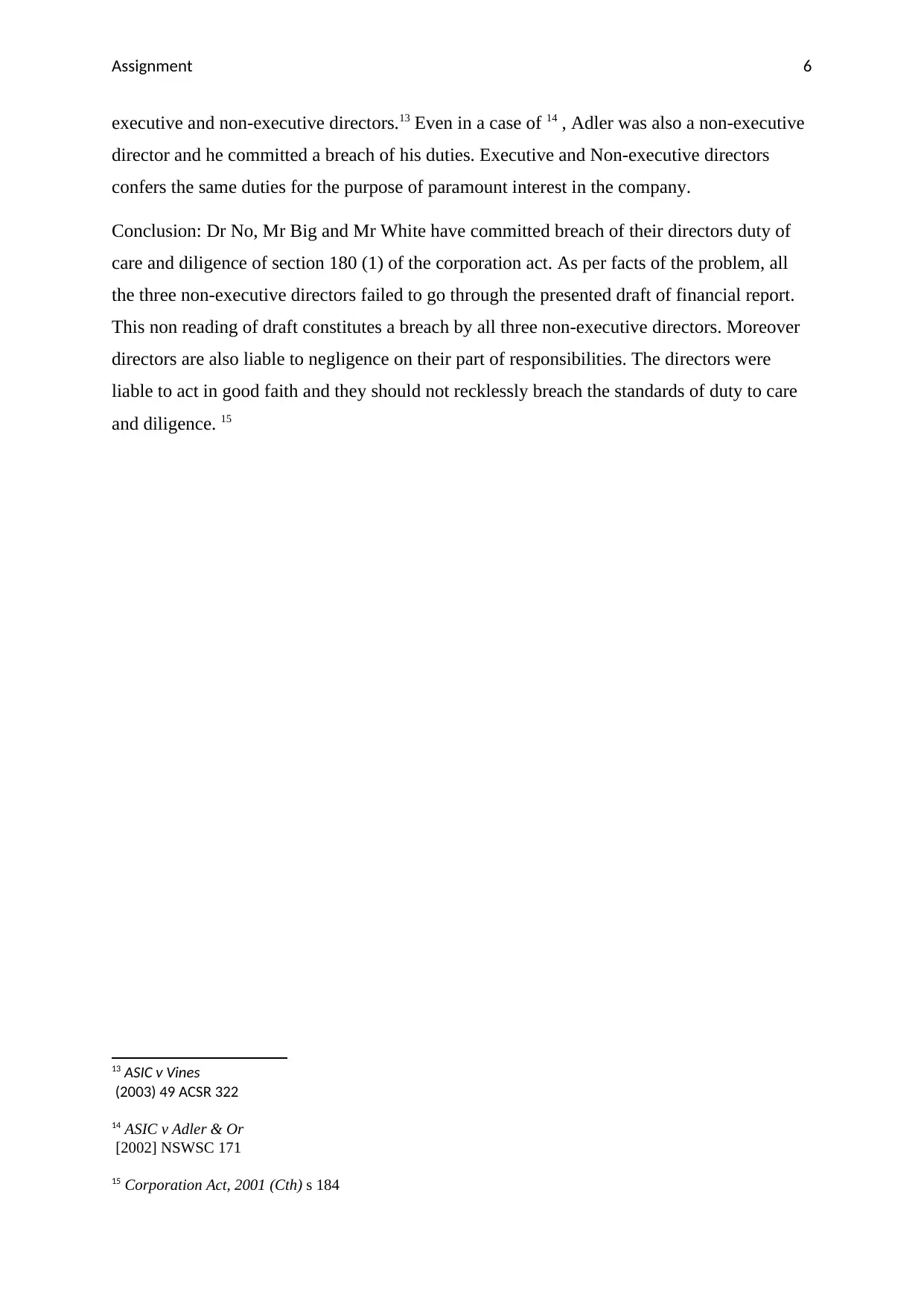
Assignment 6
executive and non-executive directors.13 Even in a case of 14 , Adler was also a non-executive
director and he committed a breach of his duties. Executive and Non-executive directors
confers the same duties for the purpose of paramount interest in the company.
Conclusion: Dr No, Mr Big and Mr White have committed breach of their directors duty of
care and diligence of section 180 (1) of the corporation act. As per facts of the problem, all
the three non-executive directors failed to go through the presented draft of financial report.
This non reading of draft constitutes a breach by all three non-executive directors. Moreover
directors are also liable to negligence on their part of responsibilities. The directors were
liable to act in good faith and they should not recklessly breach the standards of duty to care
and diligence. 15
13 ASIC v Vines
(2003) 49 ACSR 322
14 ASIC v Adler & Or
[2002] NSWSC 171
15 Corporation Act, 2001 (Cth) s 184
executive and non-executive directors.13 Even in a case of 14 , Adler was also a non-executive
director and he committed a breach of his duties. Executive and Non-executive directors
confers the same duties for the purpose of paramount interest in the company.
Conclusion: Dr No, Mr Big and Mr White have committed breach of their directors duty of
care and diligence of section 180 (1) of the corporation act. As per facts of the problem, all
the three non-executive directors failed to go through the presented draft of financial report.
This non reading of draft constitutes a breach by all three non-executive directors. Moreover
directors are also liable to negligence on their part of responsibilities. The directors were
liable to act in good faith and they should not recklessly breach the standards of duty to care
and diligence. 15
13 ASIC v Vines
(2003) 49 ACSR 322
14 ASIC v Adler & Or
[2002] NSWSC 171
15 Corporation Act, 2001 (Cth) s 184
Paraphrase This Document
Need a fresh take? Get an instant paraphrase of this document with our AI Paraphraser
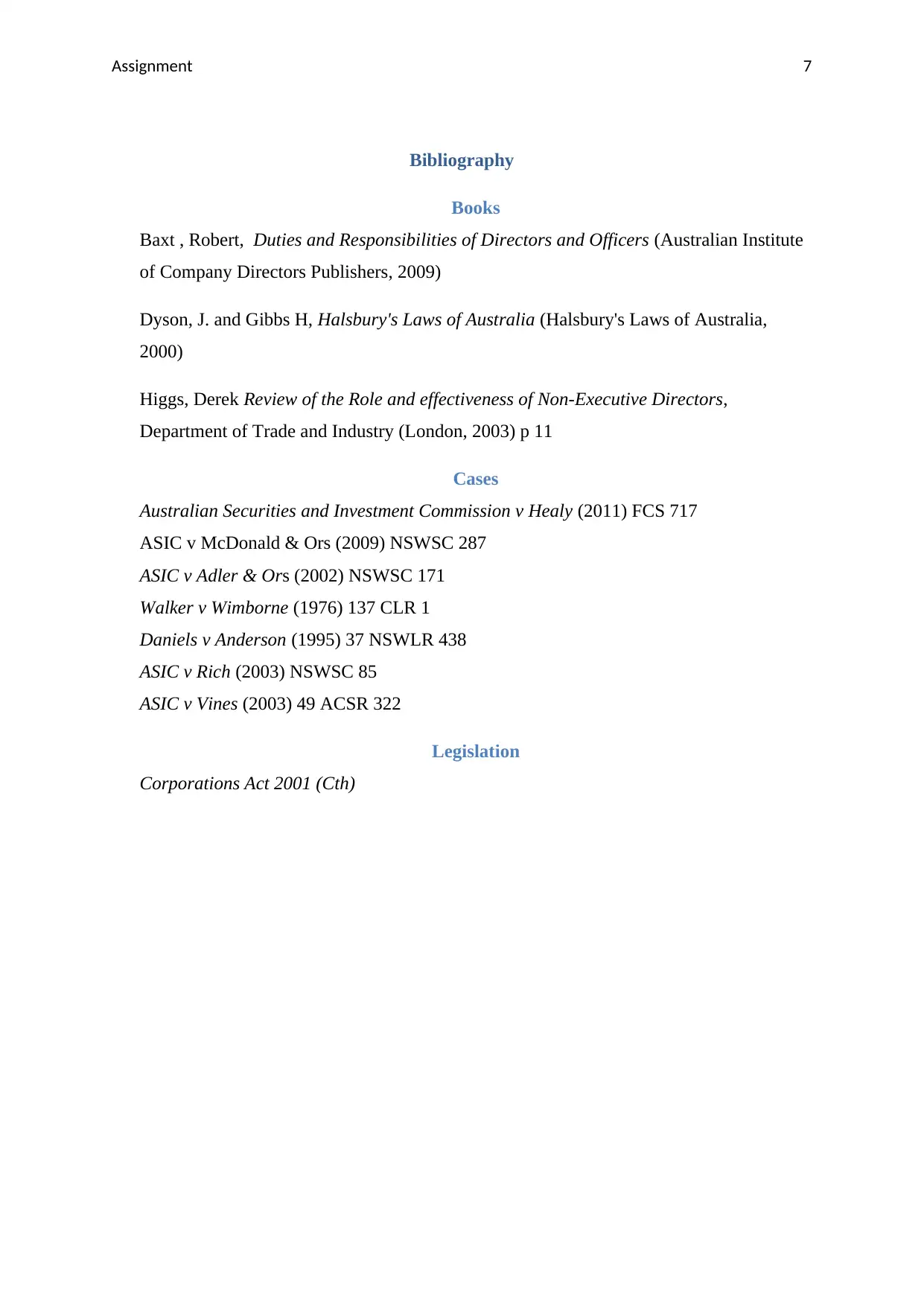
Assignment 7
Bibliography
Books
Baxt , Robert, Duties and Responsibilities of Directors and Officers (Australian Institute
of Company Directors Publishers, 2009)
Dyson, J. and Gibbs H, Halsbury's Laws of Australia (Halsbury's Laws of Australia,
2000)
Higgs, Derek Review of the Role and effectiveness of Non-Executive Directors,
Department of Trade and Industry (London, 2003) p 11
Cases
Australian Securities and Investment Commission v Healy (2011) FCS 717
ASIC v McDonald & Ors (2009) NSWSC 287
ASIC v Adler & Ors (2002) NSWSC 171
Walker v Wimborne (1976) 137 CLR 1
Daniels v Anderson (1995) 37 NSWLR 438
ASIC v Rich (2003) NSWSC 85
ASIC v Vines (2003) 49 ACSR 322
Legislation
Corporations Act 2001 (Cth)
Bibliography
Books
Baxt , Robert, Duties and Responsibilities of Directors and Officers (Australian Institute
of Company Directors Publishers, 2009)
Dyson, J. and Gibbs H, Halsbury's Laws of Australia (Halsbury's Laws of Australia,
2000)
Higgs, Derek Review of the Role and effectiveness of Non-Executive Directors,
Department of Trade and Industry (London, 2003) p 11
Cases
Australian Securities and Investment Commission v Healy (2011) FCS 717
ASIC v McDonald & Ors (2009) NSWSC 287
ASIC v Adler & Ors (2002) NSWSC 171
Walker v Wimborne (1976) 137 CLR 1
Daniels v Anderson (1995) 37 NSWLR 438
ASIC v Rich (2003) NSWSC 85
ASIC v Vines (2003) 49 ACSR 322
Legislation
Corporations Act 2001 (Cth)
1 out of 8
Related Documents
Your All-in-One AI-Powered Toolkit for Academic Success.
+13062052269
info@desklib.com
Available 24*7 on WhatsApp / Email
![[object Object]](/_next/static/media/star-bottom.7253800d.svg)
Unlock your academic potential
Copyright © 2020–2026 A2Z Services. All Rights Reserved. Developed and managed by ZUCOL.



![ASIC v Healey [2011] FCA 717: A Case Study on Director's Duties](/_next/image/?url=https%3A%2F%2Fdesklib.com%2Fmedia%2Fimages%2Ffk%2F3d1ef86084bc494bb7904e1405d0c700.jpg&w=256&q=75)

